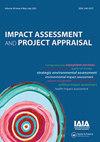Distilling best practice principles for public participation in impact assessment follow-up
IF 1.9
4区 社会学
Q3 ENVIRONMENTAL STUDIES
引用次数: 4
Abstract
ABSTRACT Building upon principles for public engagement and for impact assessment (IA) follow-up, this paper distils best practice principles specific to public participation in IA follow-up. Literature review, followed by a simple survey distributed to IA follow-up and/or public engagement practitioners, helped identify key principles and related published sources. Twelve principles for public participation in IA follow-up are presented, which relate to (1) mandatory public reporting, (2) ease of access to published material, (3) full transparency, (4) clarity about the IA follow-up process, (5) input to decision-making, (6) continuous access to IA follow-up activities and feedback, (7) independent verification, (8) two-way communication, (9) partnerships, (10) Indigenous inclusion, (11) participatory monitoring, and (12) involvement in adaptive management. They form a ladder of public engagement; the initial principles pertain mainly to information provision, with increasing levels of participation and legitimacy inherent in the latter principles. The principles are intended to provide a foundation for practitioners and community members involved in IA follow-up to enhance practice at all stages of the development life cycle, helping to achieve sustainable development.提炼公众参与影响评估后续行动的最佳做法原则
摘要基于公众参与和影响评估(IA)后续行动的原则,本文提炼了公众参与IA后续行动的最佳实践原则。文献综述,然后向IA后续行动和/或公众参与从业者分发一份简单的调查,有助于确定关键原则和相关出版来源。提出了公众参与IA后续行动的12项原则,这些原则涉及(1)强制性公开报告,(2)方便获取已发表的材料,(3)完全透明,(4)明确IA后续行动过程,(5)决策投入,(6)持续获取IA后续活动和反馈,(7)独立核查,(8)双向沟通,(9)伙伴关系,(10)土著人融入,(11)参与性监测,以及(12)参与适应性管理。它们构成了公众参与的阶梯;最初的原则主要涉及信息提供,后一原则所固有的参与程度和合法性不断提高。这些原则旨在为参与IA后续行动的从业者和社区成员提供基础,以加强发展生命周期各个阶段的实践,帮助实现可持续发展。
本文章由计算机程序翻译,如有差异,请以英文原文为准。
求助全文
约1分钟内获得全文
求助全文
来源期刊

Impact Assessment and Project Appraisal
ENVIRONMENTAL STUDIES-
CiteScore
4.60
自引率
22.70%
发文量
52
期刊介绍:
This is the international, peer-reviewed journal of the International Association for Impact Assessment (IAIA). It covers environmental, social, health and other impact assessments, cost-benefit analysis, technology assessment, and other approaches to anticipating and managing impacts. It has readers in universities, government and public agencies, consultancies, NGOs and elsewhere in over 100 countries. It has editorials, main articles, book reviews, and a professional practice section.
 求助内容:
求助内容: 应助结果提醒方式:
应助结果提醒方式:


